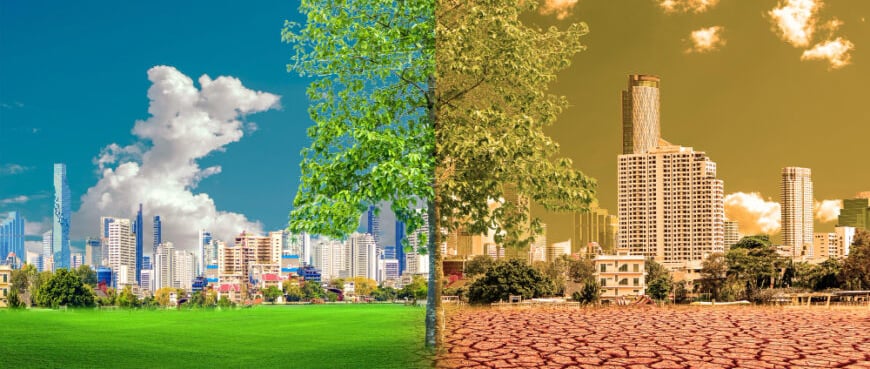Do You Know How Climate Change Affects You Every Day
#DoYouKnow, #ClimateChange, #Environment, #AirPollution, #GreenPlanet, #GlobalWarming, #EcoFriendly, #SaveEarth, #SustainableLiving, #ClimateAction, #EverydayClimate, #EducationalContent, #AwarenessMatters
KNOWLEDGE & EDUCATION
7/24/20253 min read


When most people hear the words “climate change,” they imagine melting glaciers, polar bears on shrinking ice caps, or headlines about wildfires in distant countries. But climate change isn’t just a future threat—it’s already impacting your life, every single day.
From the food on your plate to the air you breathe, let’s uncover how climate change is affecting you right now, in ways you may have never considered.
1. The Air You Breathe Is Getting Worse
Have you noticed hazier skies or worsening allergies? That’s not your imagination. Climate change is directly linked to air quality.
Warmer temperatures increase ground-level ozone, a major component of smog.
More heat waves = more wildfires = more smoke particles in the air.
These pollutants aggravate asthma, allergies, bronchitis, and even heart disease.
Even if you don’t live in a wildfire zone, the wind carries smoke across countries and continents, reducing the quality of air globally.
2. Your Food Is Changing—In Taste and Price
Climate change is disturbing agricultural patterns across the world.
Crops like wheat, rice, and maize are sensitive to temperature and rainfall. Heatwaves can reduce yields.
Droughts dry up farmlands; floods destroy them.
This affects not just availability, but also the nutritional value and taste of food.
For example:
Tomatoes exposed to heat produce less sugar and vitamin C.
Coffee yields are dropping, making your morning cup more expensive.
3. Your Daily Expenses Are Rising
Everyday goods and services are becoming more expensive, often due to climate-related factors:
Transportation delays caused by extreme weather increase shipping costs.
Insurance premiums rise due to higher risks of floods, storms, and wildfires.
Local governments invest more in climate resilience—costs that are eventually passed on to you.
Inflation is no longer just an economic issue—it’s an environmental one too.
4. Water Scarcity Isn’t Just for Desert Nations
You may think water shortage only happens in dry places, but climate change is making it a global concern:
Rainfall patterns are shifting—some regions get too much, others too little.
Melting glaciers threaten freshwater sources for millions.
Droughts affect crops and power generation.
Cities like Cape Town and Chennai have come dangerously close to running out of water. Could your city be next?
5. Your Health Is at Risk
Climate change has been called the biggest health threat of the 21st century.
How?
Heat-related illnesses like heatstroke are increasing.
Vector-borne diseases like malaria, dengue, and Zika are spreading to new areas as warmer climates become more hospitable for mosquitoes.
Food-borne and water-borne illnesses rise with higher temperatures.
In fact, climate-related deaths are already estimated at 150,000 per year globally.
6. It Affects Your Mental Health Too
Extreme weather doesn’t just damage property—it shakes lives.
Victims of floods, wildfires, and hurricanes suffer from anxiety, PTSD, and depression.
Young people globally report climate anxiety, fearing for their future.
Even seeing repeated negative climate news creates a sense of helplessness. But awareness is the first step to empowerment.
7. Your City Is Under Pressure
Cities are bearing the brunt of climate change:
Urban “heat islands” make city temperatures 2–7°C higher than surrounding areas.
Drainage systems often can’t handle the increased rainfall, leading to flash floods.
Power grids struggle during heatwaves due to surging demand for air conditioning.
More cities are installing cool roofs, planting trees, and switching to green energy to fight back.
8. Extreme Weather Events Are Increasing
From record-breaking heatwaves in Europe to floods in China, droughts in Africa, and wildfires in Canada, extreme weather has become more frequent and intense.
These aren’t random events. Scientists say that climate change makes:
Heatwaves 5x more likely.
Hurricanes stronger and wetter.
Droughts longer-lasting.
Even if your area is “safe,” global interconnectivity means your economy, supply chains, and even online services can be disrupted by climate events far away.
9. Energy Use Is Shifting
Have you noticed higher electricity bills in summer?
Climate change increases reliance on air conditioning.
It can disrupt hydropower and wind due to drought or storms.
Fossil fuel use may rise again when renewables fail to meet demand during extreme weather.
Smart homes, solar panels, and energy efficiency are becoming more crucial than ever.
10. Your Choices Matter More Than Ever
It may feel overwhelming, but individual and community action does make a difference.
What can you do?
Reduce food waste.
Use public transport or carpool.
Support sustainable brands.
Plant trees or support reforestation projects.
Stay informed and vote for climate-conscious policies.
Even your searches, clicks, and social shares help raise awareness.
Conclusion: Climate Change Is Not Distant—It’s Daily
The truth is, climate change is not just about polar bears or future generations. It’s about you, your health, your home, your money, and your children’s tomorrow.
And the more we know, the more we can adapt and act.
Knowledge
Empowering minds with reliable educational content daily.
Newsletter Signup
© 2025 DoYouKnow. All rights reserved.
Stay Ahead of the Trends – Join Our Newsletter
